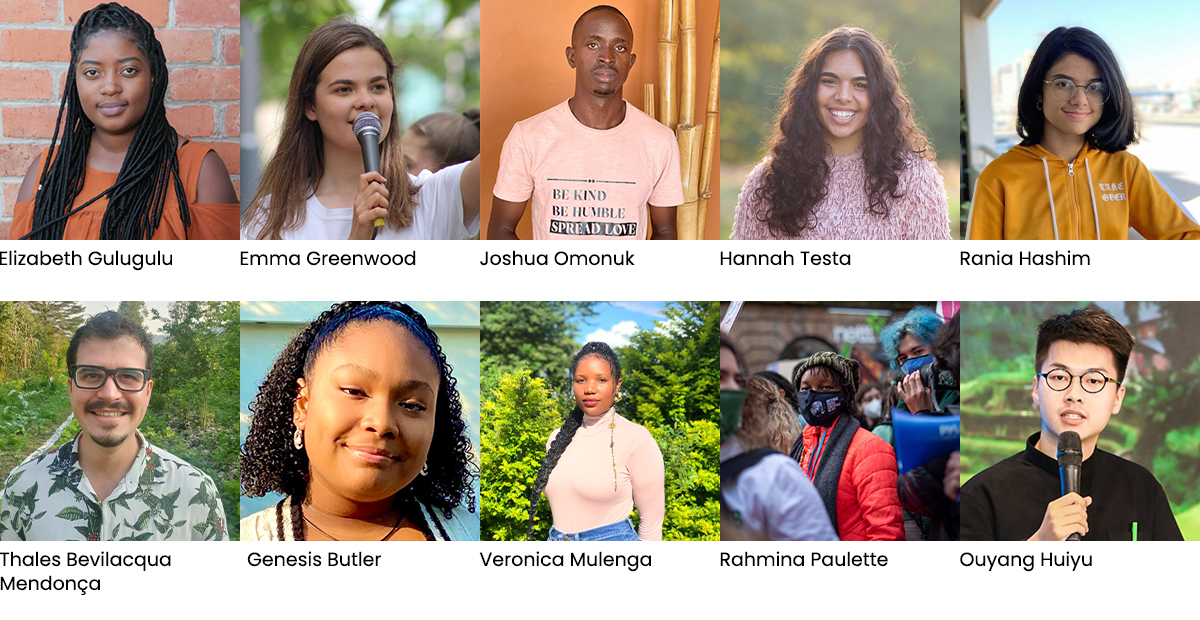June 6, 2022
ProVeg International, a non-governmental food awareness organization, working to change global food systems, recently announced the launch of its Youth Board. Comprising ten young activists from across the globe, the Youth Board will promote ProVeg's goal of reducing meat consumption by 50% by 2040 under the banner "Diet Change Not Climate Change."

The role that food systems have to play in tackling climate change has long been underestimated. In 2006, the UN, in its landmark report 'Livestock's Long Shadow' called for “urgent” action around animal agriculture but in 2020 90% of national commitments made to the Paris Climate Agreement failed to account for the whole food system, with diet, food loss and waste "widely ignored." More recently, at COP26, world leaders were again accused of ignoring the environmental impact of animal agriculture, despite it being responsible for at least 87% of greenhouse gas emissions and being the "leading cause of climate change." Nevertheless, the IPCC's most recent report is a stark reminder that without diversifying global diets and creating sustainable food systems, ecological disaster is inevitable.
Alongside food systems being neglected as a mitigation opportunity, for too long young people have also been left out of the climate change conversation. This is despite youth being the most energized demographic leading the way on climate change as well as those who will be most affected by its impact. Combating both of these issues, ProVeg International has launched its Youth Board to give young people across the globe a voice and help them influence policymakers to enact real change in global food systems.
The Youth Board, which launched on March 30, 2022, brings together ten young activists from four continents. The ten-strong group will use their experience as active campaigners in the field of climate change to influence policymakers attending this year's COP27, due to take place in the Egyptian city of Sharm El-Sheikh from November 7-18.
During Earth Week, Madaline Dunn caught up with Juliette Tronchon, policy and public affairs specialist at ProVeg, to learn more about the Youth Board's launch and why the organization believes young people must be central to climate change discussions.
Tronchon explained that the youth represent powerful change agents and, while young people are often given representation at big climate change events, they are rarely given a voice. Through the Youth Board, ProVeg intends to give them a platform where they will be listened to and heard. “By joining the Youth Board, these ten young people will have the support of the ProVeg team to articulate through social media channels and in live presentations the paramount importance of transforming our food systems by replacing animal-based products with plant-based products and cultured meat alternatives," she said.
Tronchon explained that when selecting activists to join the Youth Board the team wanted the group to be as diverse as possible and include representation from the MENA region due to the next United Nations Climate Change Conference (COP27) taking place in Egypt. Those serving on the Youth Board include: 15-year-old Genesis Butler from the US, an environmental campaigner and founder of Youth Climate Save; Elizabeth Gulugulu, an environmental scientist and climate change activist from Zimbabwe and one of the top 100 Young African Conservation Leaders; Rania Hashim, a 15-year-old activist from India and the UAE who is an alumni at the Knowledge Society; Zambian climate activist Veronica Mulenga, a climate change and environmental justice campaigner who works with Youth Climate Save; Emma Greenwood, former youth MP for Bury, UK and climate and youth voice activist; Rahmina Paulette, a 16-year-old climate activist, environmentalist and wildlife conservationist from Kenya; Ouyang Huiyu, a campaigner from China who works for the Good Food Fund (GFF) and the China Biodiversity Conservation and Green Development Foundation; US-based Hannah Testa, a 19-year-old sustainability advocate and founder of Hannah4Change; Thales Bevilacqua Mendonça, a young organic agroforestry farmer from Brazil and Joshua Omonuk, a climate activist from Uganda.
Commenting on his decision to join the Youth Board, Omonuk, who gave up his full-time job as a statistician to pursue climate change work, said he believes transitioning to plant-based diets on a global scale is possible. "Plant-rich diets reduce emissions and also tend to be healthier, leading to lower rates of chronic disease. I believe shifting to a diet rich in plants is a demand-side solution to global warming. Meat-based diets come with a steep climate price tag. To ease this transition, plant-based options must be available, visible, and enticing, including high-quality meat substitutes," he said.
Each of the activists on the board has something unique to bring to the table and their own set of goals. At the Youth Board's first meeting, which took place on April 17, the activists discussed their ambitions and objectives. Tronchon explained that Rania Hashim, in particular, is focused on how emerging technologies like cellular agriculture and biotechnology can transform food systems. Thales Mendonça, on the other hand, expressed his interest in concentrating on youth in agriculture.
The GPC chatted to Mendonça ahead of the board's first meeting to hear about his involvement with the Youth Board and his perspective on climate change. Mendonça runs a small farm, ProNobis Agroflorestal, with his wife, where they grow a wide range of vegetables, fruit, mushrooms and forests and sell their produce locally. Alongside his involvement with ProVeg International, he's also a representative at the Intercontinental Network of Organic Farmers Organizations (INOFO) and attended the UN Food Systems Pre-Summit in Rome in July 2021 as a speaker.
Speaking from his farm in the south of Brazil, Mendonça talked about the environmental challenges his country faces and the devastating impacts of deforestation in Brazil due to animal agriculture. In 2021, deforestation in Brazil's Amazon hit a 15-year-high, with much of it set alight for land clearing. "The Amazon is burning," said Mendonça. He went on to describe a kind of consumer cognitive dissonance, where people don't want to see the Amazon go up in flames but simultaneously continue to consume meat and GMO products every day. "As farmers, we have to do something different to promote more resilient food systems," he explained, adding: "With our diets, we can contribute to the mitigation of climate change effects."
Commenting on the role that political leaders have to play in changing food systems, Mendonça reflected on President Jair Bolsonaro's impact on Brazil. "He's very aligned with traditional agriculture because it's what Brazil's economy is based on." However, Mendonça explained that successive governments have pillaged the country's natural resources and failed to put policies in place to protect its lands. "If it were made a governmental priority, it would be doable, but there are lots of big companies that are interested in the land, and so they support all of the current mechanisms in place. When Bolsonaro got his mandate, it became so much worse." In light of the upcoming presidential election in Brazil, Mendonça said that it's unlikely Brazil will reach any of its sustainability targets with the current government in control. When asked about Bolsonaro's pledge to end and reverse deforestation by 2030, Mendonça said he believed it was just another political move and an example of governmental greenwashing.
Despite the lack of action Mendonça is witnessing in his own country, looking ahead, he remains cautiously optimistic about the future of global food systems and says that farmers must be a part of the conversation. "We know it's not something that will happen overnight, but we all have to come together: stakeholders, farmers, scientists, academics, sellers, traders, governmental and non-government organizations." He added: "We often see discussions around solutions for farmers without farmers at the table. We need a seat at the table and want to be part of the change - and change has to happen now because I'm not optimistic we can sustain this current model much longer."
Emma Greenwood, climate activist, coordinator of Youth Strikes 4 Climate in Manchester, and member of the Youth Board, echoed these sentiments. In a statement to the GPC, Greenwood said: "Sustainable consumption of resources is at the forefront of the long-run adaptation needed to tackle the climate crisis. Domestic and international governments need to ensure plant-based diets are integrated as part of climate-crisis mitigation strategies and policies. By championing a more plant-based diet, individuals can be a part of creating the systemic change needed to protect the planet for those in the present and those yet to come."
Having brought together ten brilliant young minds passionate about raising climate change awareness, ProVeg International has big plans for the Youth Board. It said that its members will be at the center of decision making and encouraged to pursue activities in their respective fields of expertise. Tronchon said the Youth Board will be included in the organization's COP27 plans, where board members will be given the opportunity to meet with national delegates, network with other activists, and influence policymakers to act on climate change and global food systems.
Highlighting the importance of youth being involved in climate decisions, board member Hashim said: "Incorporating youth in global climate movements is integral to sustainable development as it is youth who are most affected by climate decisions we take today."
Intending to inspire other activists from across the globe to take action and pressure policymakers in their respective countries, ProVeg is also working on a template letter to be published on its website, which activists will be able to use, customize and send to different governments and ministries.


ProVeg International / Global food systems / Youth Board / Diet Change Not Climate Change / Food systems / Climate change
Disclaimer: The opinions or views expressed in this publication are those of the authors or quoted persons. They do not purport to reflect the opinions or views of the Global Pulse Confederation or its members.